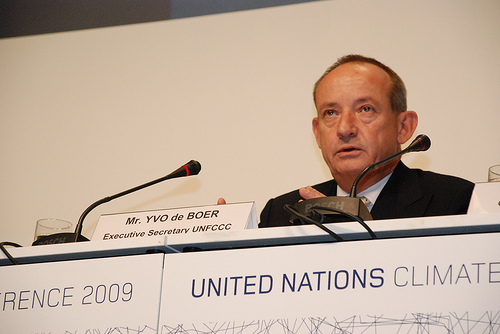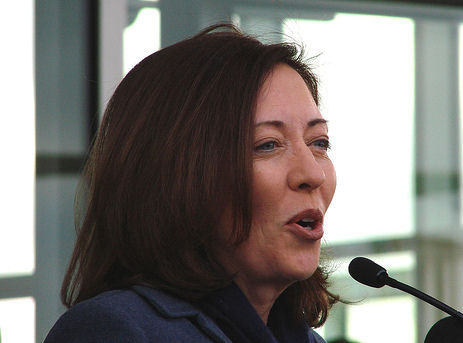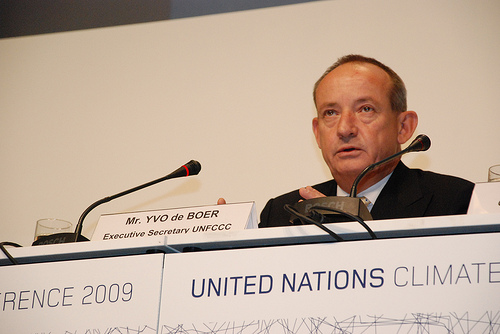Well, here we are at last. After two years of largely fruitless negotiations, the real bargaining on the terms of a new global climate pact has just begun.
 Yvo de Boer, the U.N. official charged with shepherding a new international climate pact, must feel as if he’s carrying the world on his shoulders as COP15 enters its final week.Courtesy UNFCCCAfter a confusing first week of the Copenhagen summit, with conflicting texts of a draft agreement (at least five of them) apparently being drawn up in every corner of the spectacularly ugly Bella Center, some order has finally been imposed on the proceedings.
Yvo de Boer, the U.N. official charged with shepherding a new international climate pact, must feel as if he’s carrying the world on his shoulders as COP15 enters its final week.Courtesy UNFCCCAfter a confusing first week of the Copenhagen summit, with conflicting texts of a draft agreement (at least five of them) apparently being drawn up in every corner of the spectacularly ugly Bella Center, some order has finally been imposed on the proceedings.
So the stage is set for a truly momentous few days. If, as I was advised in a letter from an authoritative expert last January, Copenhagen makes 2009 “the most important year in human history,” then we are entering its most crucial week. If the conference is successful, then the more than 100 world leaders due to come to the Danish capital this week will initiate the biggest economic change since the Industrial Revolution, turning the world away from an ever growing reliance on fossil fuels towards what is being increasingly dubbed “low carbon prosperity.”
At least the process of the negotiations is now resolved, even if very little else is. First, the conflicting, sometimes leaked, texts have all been jettisoned in favor of simple documents drawn up by the chairmen of the relevant negotiating committees. And everyone has agreed to use them as the basis of an eventual deal, a major step forward.
Next, ministers from around the world have begun meeting in permanent session to resolve outstanding issues. Lower-level officials will continue to labor over the new negotiating texts, but when they cannot agree they will now refer each dispute to the ministers. If they also cannot resolve the matter, it will go on to the leaders.
One dispute that may go all the way to the top is the objective of the agreement itself. Until recently, this was expected to be to keep global warming beneath two degrees centigrade. That’s still the goal of the big polluters, whether developed countries or industrializing ones like China and India. Science, however, increasingly indicates that this would not save low-lying island nations or other vulnerable countries from devastation, and over 100 delegations -– backed by a fast-growing, worldwide youth movement pressing for concentrations of carbon dioxide in the atmosphere to be brought back to 350 parts per million — is demanding no more than 1.5 degrees.
The problem is that past emissions have already set the world on course to experience that degree of warming, and there is no way the big polluters will agree to the drastic measures needed to stop at that point, which would involve actually reducing concentrations by some 10 percent from their present level. The best the potential victims are likely to get is an agreement on two degrees to be reviewed in a few years after further scientific studies.
Even achieving that will be hard: the measures offered by industrialized countries so far fall short of the lower end of the 25-40 percent cut in emissions that scientists say will be needed by 2020. Vigorous attempts will be made this week — not least by the Danish government and by Yvo de Boer, the UN official in charge of the negotiations — to get them to do more.
Targets for 2050 are also highly controversial. Rich countries have agreed that global emissions should be halved by then and offered to reduce theirs by 80 percent. But, revolutionary though that would be, achieving that would still mean that developing countries would have to make big cuts too -– perhaps by 60 percent per capita, cuts made all the more painful by the continued population growth poor nations are expected to experience. They are resisting, demanding massive financial help.
Rich countries are offering an emergency fund of $10 billion a year to help the poorest countries cope with climate change. The trouble is that this is almost entirely made up of existing aid, diverted from other needs. The Third World is understandably unimpressed.
 The big battle, however, is over longer-term finance. A consensus has emerged among developed nations that this should be about $100 billion a year. Developing countries –- and some pressure groups like the World Wildlife Fund — say it needs to be much more, but even this figure will be hard to achieve. President Obama will be severely constrained on what he can offer while climate legislation remains held up in the U.S. Senate, and other nations will not want to commit until the United States does.
The big battle, however, is over longer-term finance. A consensus has emerged among developed nations that this should be about $100 billion a year. Developing countries –- and some pressure groups like the World Wildlife Fund — say it needs to be much more, but even this figure will be hard to achieve. President Obama will be severely constrained on what he can offer while climate legislation remains held up in the U.S. Senate, and other nations will not want to commit until the United States does.
There also is division on how measures to cut greenhouse gas emissions will be monitored and verified. The industrializing developing countries have made unexpectedly large offers on cutting the rate at which their emissions will grow, but see these as voluntary commitments and resist any suggestion that they should be subject to international control. The United States and other developed countries insist that these promises must be checked and enforced — but then object to any suggestion of similar controls over their own emissions reductions promises.
Finally, there are arguments over the very form of any deal. Developing countries are insisting on retaining and improving the Kyoto Protocol, but its very name is anathema in the United States, and Russia is also privately turning against it. The likeliest outcome is a toughened Kyoto Protocol, with a linked treaty covering the United States and developing countries (at present excluded from its provisions) and new agreements made in Copenhagen.
None of this will be agreed unless and until it is all agreed. It will be one big package, or nothing. And it may all come down to the last few hours of the last day — or night, since no one wants to move until the last minute. The outcome of the Copenhagen talks is going to be a cliffhanger.
Spread the news on what the føck is going on in Copenhagen with friends via email, Facebook, Twitter, or smoke signals.




